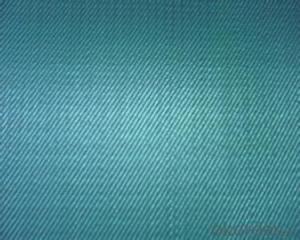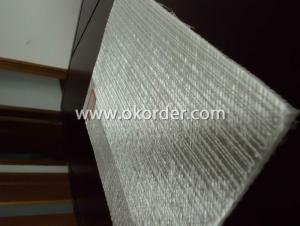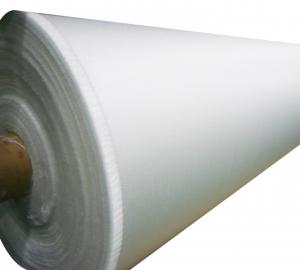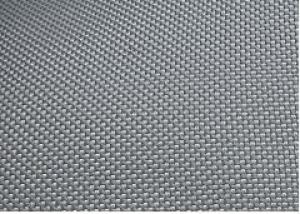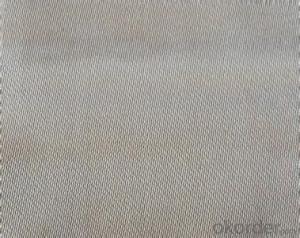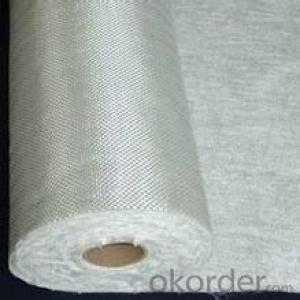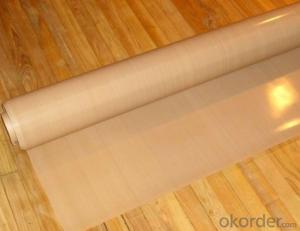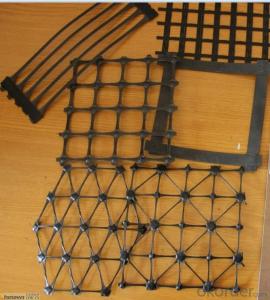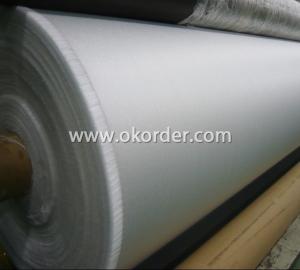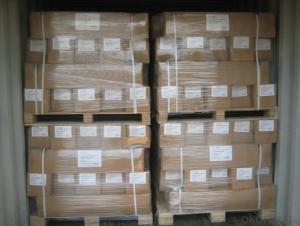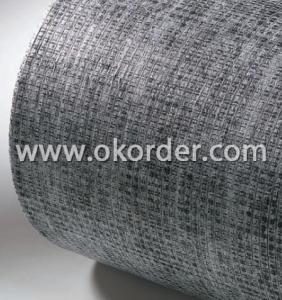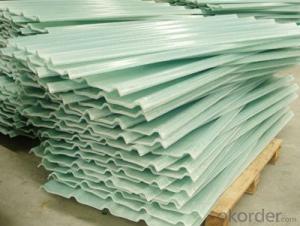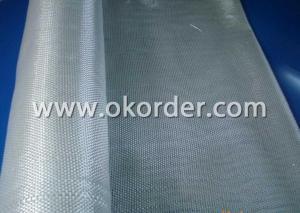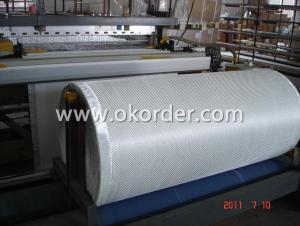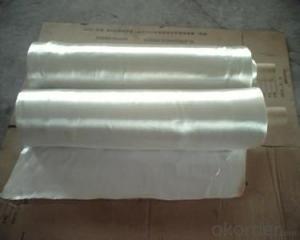Silica Electric Fiber Glass Cloth
- Loading Port:
- China Main Port
- Payment Terms:
- TT OR LC
- Min Order Qty:
- -
- Supply Capability:
- -
OKorder Service Pledge
Quality Product, Order Online Tracking, Timely Delivery
OKorder Financial Service
Credit Rating, Credit Services, Credit Purchasing
You Might Also Like
Quick Details
| Place of Origin: | Brand Name: | Model Number: | |||
| Application: | Weight: | Width: | |||
| Mesh Size: | Weave Type: | Yarn Type: | |||
| Alkali Content: | Standing Temperature: | desity of warp: | |||
| desity of wefy: |
Packaging & Delivery
| Packaging Detail: | opp bag then carton box |
| Delivery Detail: | 15-20days after received deposit |
Specifications
1.temperature of fireproof:1770-2000
2.breaking strength:2100N/50NM
3.texture:plain weave
- Q:How does fiberglass fabric perform in thermal conductivity?
- Fiberglass fabric has relatively low thermal conductivity, meaning it is a poor conductor of heat. This property makes it an excellent insulating material. The structure of fiberglass fabric consists of fine glass fibers, which have low thermal conductivity due to their low density and lack of metallic components. As a result, fiberglass fabric can effectively resist the transfer of heat, keeping the temperature on one side of the fabric from affecting the other side. This makes it suitable for applications where thermal insulation is required, such as in the construction of thermal blankets, oven insulation, or as a lining for industrial equipment. Additionally, the low thermal conductivity of fiberglass fabric contributes to its fire-resistant properties, as it does not readily transfer heat to ignite or support combustion. Overall, fiberglass fabric performs well in thermal conductivity by providing insulation and fire resistance.
- Q:How does fiberglass fabric perform in chemical environments?
- Fiberglass fabric is known for its excellent performance in chemical environments. It is highly resistant to a wide range of chemicals, including acids, alkalis, solvents, and oils. The fabric's ability to withstand chemical exposure is primarily due to its composition, which consists of glass fibers that are coated or impregnated with a chemical-resistant resin. The chemical resistance of fiberglass fabric makes it an ideal choice for various applications in industries such as chemical processing, petrochemical, pharmaceutical, and food processing. It can be used in the form of curtains, gaskets, seals, and linings to protect equipment and structures from corrosive chemicals. Furthermore, fiberglass fabric's resistance to chemical exposure also extends to high temperatures. It can withstand continuous operating temperatures of up to 550°C (1022°F) without significant degradation. This property makes it suitable for applications that involve both high-temperature and chemical environments, such as thermal insulation and fire protection systems. In addition to its chemical resistance, fiberglass fabric also offers other beneficial properties. It is lightweight, durable, and has excellent mechanical strength. It is also non-flammable, providing an added layer of safety in chemical environments where fire hazards are a concern. Despite its exceptional performance in chemical environments, it is important to note that fiberglass fabric may still be susceptible to certain highly reactive chemicals or extreme conditions. Therefore, it is crucial to consult with manufacturers or experts to determine the suitability of fiberglass fabric for specific chemical environments and applications.
- Q:Can fiberglass fabric be used for making tents?
- Yes, fiberglass fabric can be used for making tents. Fiberglass fabric is a popular choice for tent construction due to its durability, strength, and resistance to wear and tear. It is lightweight, yet provides excellent protection against elements such as wind, rain, and UV rays. The fiberglass fabric is also fire-resistant and can maintain its structural integrity in extreme temperatures. Additionally, it is easy to handle and can be easily sewn or welded to create tent panels. With all these qualities, fiberglass fabric is a reliable material for making high-quality, long-lasting tents.
- Q:Is fiberglass fabric suitable for use in food packaging?
- No, fiberglass fabric is not suitable for use in food packaging.
- Q:How does fiberglass fabric perform in high-humidity environments?
- Fiberglass fabric boasts exceptional performance in environments with high humidity. Its non-absorbent properties ensure it remains impervious to moisture and unaffected by water vapor in the air. As a result, even in high-humidity conditions, fiberglass fabric maintains its structural integrity, strength, and dimensional stability. Unlike certain materials that may warp, shrink, or become brittle in humid conditions, fiberglass fabric remains unaffected. Moreover, the non-porous nature of fiberglass fabric hinders the growth of mold, mildew, and other fungi that thrive in moist surroundings. This renders fiberglass fabric an excellent choice for various applications, including boat building, outdoor furniture, and construction projects in high-humidity areas. Overall, fiberglass fabric's resistance to moisture and its ability to withstand high-humidity environments establish it as a reliable and durable material in such conditions.
- Q:What color steel plate is good for dust-free workshop?
- EPS polystyrene foam sandwich panel is composed of a color plate surface, closed self extinguishing type polystyrene foam plastic as the core material, the color pressure plate by automatic continuous molding machine with high strength after adhesive bonding and into an efficient new composite materials. Mainly used in public buildings, industrial buildings roofing, walls and electronics, medicine, food and clean workshop and the combination of cold storage, building add layer, Shangting etc. The utility model has the advantages of light weight, convenient installation, heat preservation, heat insulation, waterproof, etc., and has the characteristics of fast construction, long service life, beautiful appearance, high mechanical strength of steel materials, easy molding performance, etc..
- Q:How is fiberglass fabric used in the production of insulation papers?
- Fiberglass fabric is commonly used in the production of insulation papers due to its excellent thermal properties and durability. The fabric is usually made from fine strands of glass fibers that are woven together to form a strong and flexible material. In the production of insulation papers, fiberglass fabric is often used as a reinforcement layer. It is placed between layers of paper or other insulating materials to provide added strength and stability. The fabric helps to prevent tearing or ripping of the insulation papers, ensuring their longevity and effectiveness. Moreover, fiberglass fabric is also highly resistant to heat, making it an ideal choice for insulation applications. It can withstand high temperatures without melting or degrading, allowing it to effectively retain and reflect heat within the insulation system. This property is crucial in preventing heat loss or gain, leading to energy efficiency and cost savings. Furthermore, the use of fiberglass fabric in insulation papers enhances their fire resistance capabilities. Fiberglass is inherently non-combustible and does not contribute to the spread of flames. When incorporated into insulation papers, it acts as a barrier against fire, helping to contain and limit its spread. Overall, fiberglass fabric plays a vital role in the production of insulation papers by providing strength, thermal insulation, and fire resistance. Its use ensures that the insulation materials are durable, energy-efficient, and safe, making it a preferred choice in various industries such as construction, automotive, and aerospace.
- Q:Can fiberglass fabric be used for making roller blinds?
- Yes, fiberglass fabric can be used for making roller blinds. It is a popular choice due to its durability, light weight, and resistance to heat and moisture. Additionally, fiberglass fabric offers good light filtering properties, making it suitable for roller blinds.
- Q:Are fiberglass fabrics resistant to solvents or cleaning agents?
- Yes, fiberglass fabrics are generally resistant to solvents or cleaning agents. Fiberglass is a synthetic material made from fine fibers of glass, which provides it with excellent chemical resistance. It can withstand exposure to a wide range of solvents, cleaning agents, and chemicals without deteriorating or losing its structural integrity. This makes fiberglass fabrics an ideal choice for various applications where resistance to solvents or cleaning agents is required, such as in industrial settings, automotive components, insulation materials, and protective clothing. However, it is always recommended to check the specific chemical compatibility of the fiberglass fabric with the solvent or cleaning agent in question, as some highly aggressive chemicals may still have an impact on its performance.
- Q:Is fiberglass fabric resistant to electrical conductivity?
- Indeed, fiberglass fabric exhibits resistance to electrical conductivity. Comprised of interwoven glass fibers, fiberglass fabric consists of materials that are incapable of conducting electricity. Consequently, electrical current is unable to pass through fiberglass fabric. Due to its exceptional insulating properties and ability to shield against electrical shocks, it is frequently employed in electrical insulation applications. The non-conductive property of fiberglass fabric renders it a viable option for a wide range of electrical and electronic applications that necessitate prevention of electrical conductivity.
1. Manufacturer Overview |
|
|---|---|
| Location | |
| Year Established | |
| Annual Output Value | |
| Main Markets | |
| Company Certifications | |
2. Manufacturer Certificates |
|
|---|---|
| a) Certification Name | |
| Range | |
| Reference | |
| Validity Period | |
3. Manufacturer Capability |
|
|---|---|
| a)Trade Capacity | |
| Nearest Port | |
| Export Percentage | |
| No.of Employees in Trade Department | |
| Language Spoken: | |
| b)Factory Information | |
| Factory Size: | |
| No. of Production Lines | |
| Contract Manufacturing | |
| Product Price Range | |
Send your message to us
Silica Electric Fiber Glass Cloth
- Loading Port:
- China Main Port
- Payment Terms:
- TT OR LC
- Min Order Qty:
- -
- Supply Capability:
- -
OKorder Service Pledge
Quality Product, Order Online Tracking, Timely Delivery
OKorder Financial Service
Credit Rating, Credit Services, Credit Purchasing
Similar products
New products
Hot products
Related keywords
